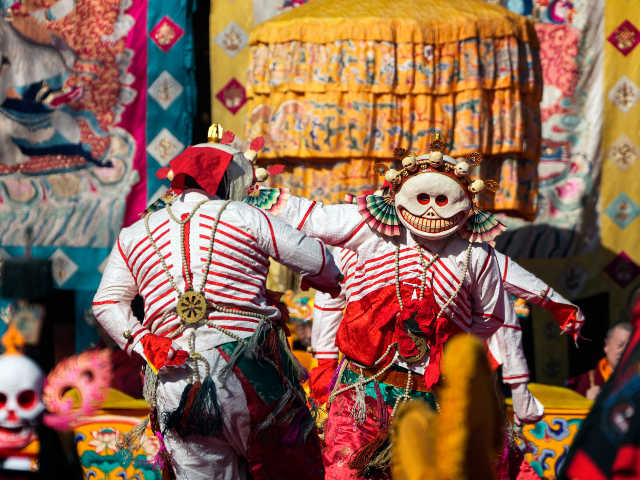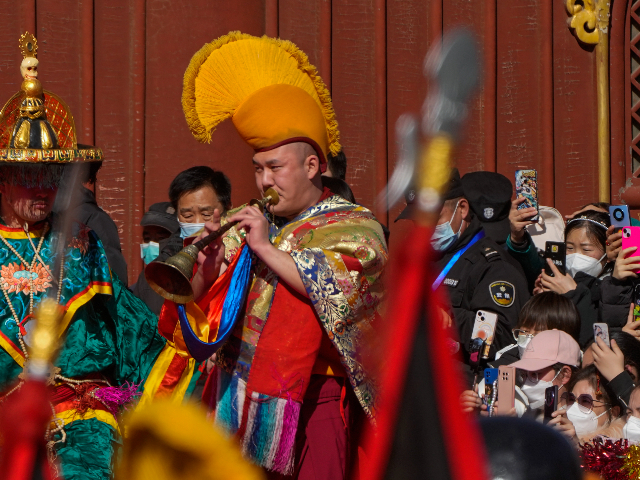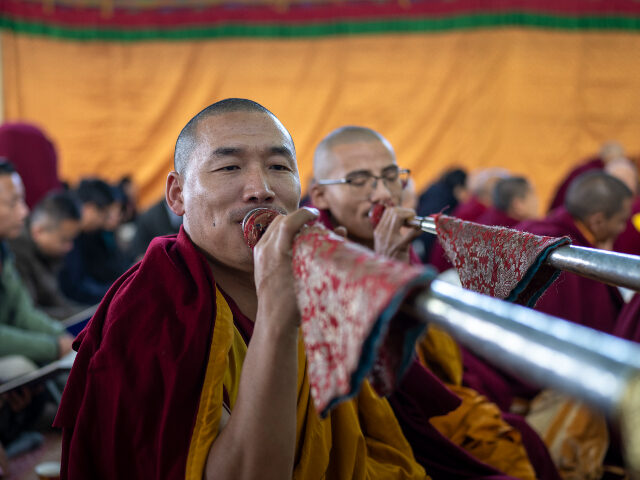China’s state-run Global Times newspaper marked the Tibetan New Year, known as Losar, on Wednesday with a forceful declaration that the officially atheist Chinese Communist Party must have full control over the selection of the next Dalai Lama, the highest authority in Tibetan Buddhism.
The Chinese Communist Party has been at war with Tibetan Buddhism since Mao Zedong invaded and colonized Tibet in 1951, what the Global Times referred to as Tibet’s “peaceful liberation.” Chinese state propaganda outlets do not even identify Tibet by its name anymore, referring to it with the Mandarin name “Xizang.” The current Dalai Lama, 87-year-old Tenzin Gyatso, was selected in 1940 and thus not under the purview of communist China. The Dalai Lama lives in exile in India, branded a traitor to communism and a terrorist by Beijing.
The legitimate Panchen Lama, a Tibetan Buddhist authority traditionally on par with the Dalai Lama, disappeared in 1995 at the age of six, shortly after the Dalai Lama chose him. The Communist Party selected its own Panchen Lama shortly thereafter who remains a public figure and advises Tibetan Buddhists to obey the Party. Most Tibetan Buddhists reject the communist replacement and still demand to know the whereabouts of the true Panchen Lama. Beijing insists the boy grew up healthy and in private but has not given any proof of life since his disappearance.

Tibetan monks in ghoulish costumes perform dance during a ceremony to chase away the “demon king” to bring peace and happiness for the Tibetan New Year at the Yonghegong Lama Temple in Beijing, Sunday, Feb. 19, 2023. The annual event has returned after China lifted all bans on public gatherings from the outbreak of COVID-19. (AP Photo/Andy Wong)
The Chinese Communist Party is allowing Tibetans to celebrate Losar between February 20 and 26. According to the Global Times, the regime took the occasion to broadcast a propaganda series on state television to give “a detailed account of the search for the reincarnations of the Dalai Lama and Panchen Lama.” The program, relaying the medieval history of Tibetan Buddhism, concluded that the Communist Party is the only authority tasked with choosing the living Buddhas – despite the Chinese Communist Party existing for less than a century and openly condemning all religions.
“In 1653, when the 5th Dalai Lama came to Beijing, the Emperor Shunzhi officially conferred the title of Dalai Lama on him,” the Global Times noted. “This marked the first time that the title of Dalai Lama was granted by the central government. … Since then, it has a [sic] historical convention that the reincarnations of both the Dalai Lama and Panchen Lama must be approved by the central government, providing it with legitimacy.”
“Since Xizang’s peaceful liberation in 1951, the central government of the People’s Republic of China showed its respect by preserving this convention and religious ritual,” the state newspaper continued, describing the violent colonization of Tibet under communism. “In 1995, the 11th Panchen Lama was conferred with his title by the central government through this strict religious ritual.”
“China is the birthplace of Tibetan Buddhism and the Living Buddhas are Chinese,” the propaganda newspaper emphasized, a belief not shared by most Tibetan Buddhists. “So the reincarnation of the Dalai Lama must be carried out within Chinese territory. Furthermore, any religious affairs are part of China’s domestic affairs, so it must be done in accordance with Chinese law.”
In Tibet itself, the Communist Party has marked Losar by installing a new, pervasive surveillance camera system and flooding the occupied capital, Lhasa, with police, according to sources on the ground speaking to Radio Free Asia (RFA).
“Beginning in February, Chinese authorities started installing more surveillance cameras in Lhasa ahead of the start of Losar, citing unreasonable reasons such as for security,” an anonymous Tibetan narrated to RFA. “Police are stationed every kilometer where [members of] the public are summoned for random searches, especially of their cell phones.”
“The police are probing every shop and restaurant under an ongoing campaign called ‘Security and Welfare by the Police,’” another source described. “And the Tibetans visiting Lhasa from other parts of Tibet who are staying in hotels and guesthouses are constantly investigated and harassed.”

Visitors wearing face masks use their smartphones to film Tibetan monks performing on stage during a ceremony to chase away the “demon king” to bring peace and happiness for the Tibetan New Year at the Yonghegong Lama Temple in Beijing, Sunday, Feb. 19, 2023. The annual event has returned after China lifted all bans on public gatherings from the outbreak of COVID-19. (AP Photo/Andy Wong)
China has long oppressed the people of Tibet since the Mao era, but has greatly intensified its persecution under current dictator Xi Jinping. Xi has placed especial focus on the Communist Party micromanaging the five legal religions of China – Catholicism, Protestantism, Taoism, Islam, and Buddhism – and installing Party loyalists into the top positions of each faith to spread communist propaganda. In Tibet, regional Party chief Chen Quanguo announced the imposition of political purity tests on Buddhist monks and nuns in 2015, an attempt to ensure that all religious authorities in the region were first and foremost beholden to the government.
Chen spearheaded a campaign to erase Tibetan Buddhism from the public eye in the region, replace the Tibetan language with Mandarin, and Tibetan customs with Han ones. His success led to his appointment in 2016 to lead the Communist Party in neighboring East Turkistan, where he implemented Xi Jinping’s policy of genocide against the majority-Muslim Turkic people of the occupied region.
The erasure of the Tibetan people continues with Chen, who was unceremoniously removed from the Politburo at the end of 2022. The United Nations warned in a report published this month that the Communist Party had greatly expanded a program to separate children from their parents in Tibet, sending the children to “boarding schools” where they learned Mandarin, received Party indoctrination, and adopted Han traditions. The report suggested as many as 1 million Tibetan children were victims of this program as of this year, which it descirbed as “a mandatory large-scale programme intended to assimilate Tibetans into majority Han culture, contrary to international human rights standards.”

COMMENTS
Please let us know if you're having issues with commenting.